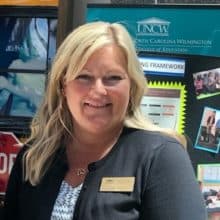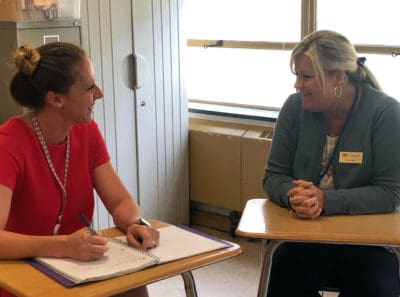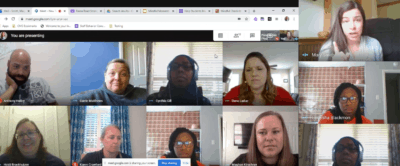
As a university-based induction program, the North Carolina New Teacher Support Program (NC NTSP) partners with educator preparation programs (EPPs) to support their mission in training pre-service teachers while strengthening university partnerships with existing school partners and building new ones. NC NTSP provides individual instructional coaching and professional development to all statewide partners, as well as additional supports that vary from region to region.
Following a turbulent spring 2020 semester, and in preparation for uncertainties related to fall 2020, NC NTSP has made a continued commitment to providing innovative and responsive support to beginning teachers (BTs) in North Carolina. This article addresses NC NTSP’s role in partnering with school systems and EPPs to increase teacher effectiveness, enhance teacher skills, and reduce attrition moving forward into the 2020-2021 school year.
Providing professional development and coaching
All NC NTSP regions provide professional development and in-classroom coaching for beginning teachers in their partner school districts. In addition, NC NTSP coaches also provide training for interns, student teachers, clinical educators/teachers, university supervisors/site coordinators, and faculty.
Professional development topics are wide-ranging and include classroom management, using data to differentiate, assessment/feedback, and more. NC NTSP coaches also work closely with EPPs to provide a variety of supplemental supports to pre-service and in-service educators, including exam preparation sessions, coaching training, and year-long PD opportunities to support communities of teachers.
Additionally, five of the 10 NC NTSP regions support their university’s lab school (Appalachian State University, East Carolina University, University of North Carolina at Charlotte, University of North Carolina Greensboro, and Western Carolina University) by providing coaching and curriculum support to their teachers.
Hosting events for beginning teachers
Several EPPs across the state host conferences for beginning teachers, and NC NTSP coaches play a vital role in the organization, planning, and logistics of these events. Coaches also work with education professionals and master teachers across the state to provide professional development to beginning teachers and mentor teachers through this programming. In the past, these events have been held face-to-face, often on university campuses. However, because of restrictions related to the pandemic, NC NTSP coaches are working with EPPs to plan virtual offerings that will engage, inspire, and inform the work of first-year teachers.
Advocacy for beginning teachers
Across the NC NTSP regions, coaches represent diverse perspectives from the field in a variety of contexts. NC NTSP coaches serve in consultative and advisory roles at EPPs, in the community, and in their partner school districts. Because of their everyday, in-classroom work with teachers and expertise in teacher development, pedagogy, and curriculum, NC NTSP coaches have extensive knowledge related to the strengths and needs of beginning teachers, including residency and other non-traditionally prepared BTs. This knowledge and practical experience enables coaches to effectively coach beginning teachers and advocate on their behalf.
Supporting beginning teachers in fall 2020
NC NTSP and EPPs are working hard to determine next steps for fall 2020 and are keenly aware of the challenges for those involved in P-12 education. As a result of school closures due to the pandemic, interns across the state had a variety of experiences in their final semester, with most having their face-to-face time in the classroom cut short. The majority of interns were able to assist with remote learning in their internship placement settings, but the swift and unexpected change in modality does leave some anticipated gaps in the experiences of the interns.
In addition to providing capacity-building in planning, instruction, and assessment, the face-to-face internship provides interns with often much-needed mentorship in classroom management skills and policies and procedures required of in-service teachers. It is expected that first-year teachers in 2020-2021 may need increased support in these areas. NC NTSP coaches are already making plans and developing strategies to help bridge these gaps and provide scaffolded supports to promote teacher and student success in the upcoming school year.
Teachers beginning their second full year of teaching in fall 2020 will likely also have different needs than second year teachers in years past, because they did not fully experience the end-of-year processes they normally would have at the conclusion of the first year teaching. This change may lead to additional areas of growth in the facilitation of formative and summative assessments, particularly as teachers did not deliver typically state-mandated tests due to the pandemic.
Just as P-12 teachers and EPPs had to pivot to virtual learning in response to pandemic-related school closures, NC NTSP coaches also quickly adapted to meet the needs of their teachers by providing virtual supports. In anticipation of extended virtual or hybrid learning in fall 2020, many NC NTSP coaches will participate in their own professional development related to virtual coaching during summer 2020. Regional directors and coaches will continue to collaborate with both EPPs and school partners to differentiate supports provided to teachers, working to ensure that NC NTSP is meeting the needs of teachers across the state in innovative and meaningful ways.
Conclusion
NC NTSP continues to be a steadfast supporter of beginning teachers and P-12 students. In these uncertain times, one thing remains certain: NC NTSP is committed to consistent, individualized, in-the-moment coaching aligned to personalized growth and professional development. For more information about partnering with NC NTSP, please contact Dr. Pat Conetta, Director of Teacher Induction and Development, at conettap18@ecu.edu.







